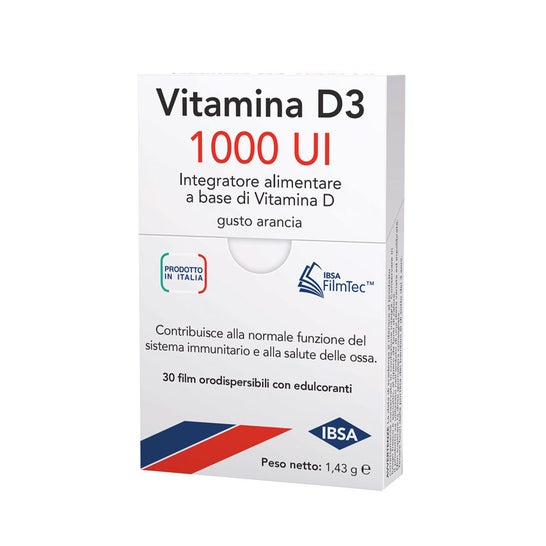A dietary supplement based on vitamin D that contributes to the normal absorption and utilization of phosphorus and calcium by the body, promoting their correct levels in the blood and the maintenance of bones. It also helps to reinforce the immune system. It is presented in the form of orodispersible film with orange flavour, which facilitates its administration to people with swallowing difficulties. It does not contain gluten or lactose and is manufactured in Italy.
Ibsa Vitamina D3 1000 UI 30uds
Description
Instructions for use
· Take 1 or 2 units a day.
· Place in the tongue to dissolve.
· Do not drink with water.
· Do not exceed the recommended daily dose.
· Keep out of the reach of children.
· Dietary supplements should not be used as substitutes for a varied and balanced diet.
Composition
Maltodextrin, Humectant (Glycerol E422), Sweetener (Mannitol E421), Extra virgin olive oil, Orange flavour, Strengthening agent (Polyvinylpyrrolidone vinyl acetate copolymer E1208), Antioxidants (Ascorbic acid E300, Alpha-tocopherol E307), Emulsifiers (Mono and diglycerides of fatty acids E471, Polyoxyethylene sorbitan monooleate E433), Colouring agents (Titanium dioxide E171, Iron oxides and hydroxides E172), Sweetener (Sucralose E955), Vitamin D, Thickener (Sodium alginate E401).
Unit price
Pharmaceutical Advice
Vitamin D3 is produced in the dermis (deep layer of the skin) through the stimulation of UVB radiation. To a lesser extent, it can also be obtained through diet, with animal products such as oily fish.
It is known to play a regulatory role in bone maintenance (calcium and phosphorus content that form the skeleton), and on the immune and endocrine systems. Severe deficiency during childhood can lead to severe damage (rickets). This is why vitamin D supplementation is often given to infants, who should not be exposed to the sun during their first year, under paediatric supervision.
In adolescents and adults, moderate sun exposure (15 minutes per day) can cover vitamin D production needs. In the case of dark phototypes or certain diseases, these needs may not be sufficiently covered. To consider supplementation, it is advisable to consult a healthcare professional.
Safety and product information
Safety visual aids
At this time we do not have safety images for this product, but we are working on it. We encourage you to check back later for updates. In the meantime, we recommend that you read the safety information that comes with the product before using it. If you have any questions about safety, please do not hesitate to contact us. Also, if you wish, you can also return the product by following our terms and conditions.
Manufacturer details
At the moment we do not have the manufacturer's details, but we are working to add them as soon as possible. We invite you to check back later for updates. If you have any questions, please do not hesitate to contact us, we will be happy to help you.
RELATED SEARCHES ABOUT Vitamins
New in Vitamins
- Vitaflor Bio Jalea Real Alta Concentración 4000mg 10x15 ml
- Médiexpert Magnesio Zinc 90caps
- Santarome Vita'Max Inmunidad 6G 20x10 ml
- Cooper Mag 2 Energía+ 30comp
- Cooper Mag 2 Boost 20comp
- Drasanvi Vitamina A Retinol 90comp
- Pileje Formag Magnesio Marino 90comp + 30comp
- Médiexpert Multivitaminas 60caps
- Prescription Nature Biotonil Efecto Inmediato 10 Sticks
- Isoxan Mi Vitalidad Gummies Adultos +18 Años Limón 60 Gummies


